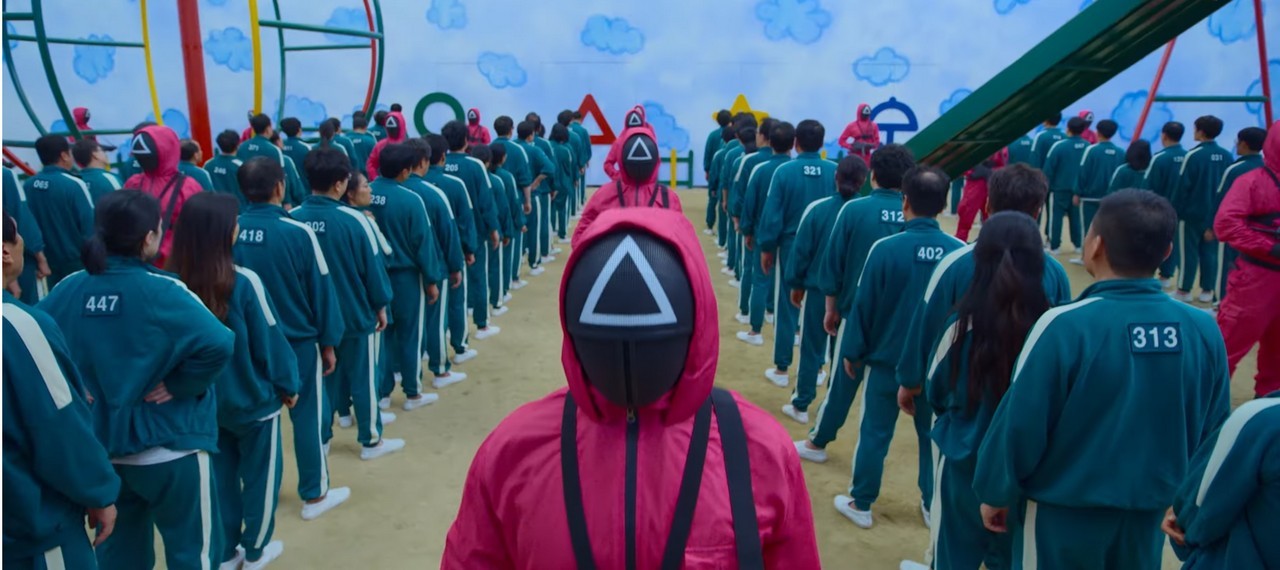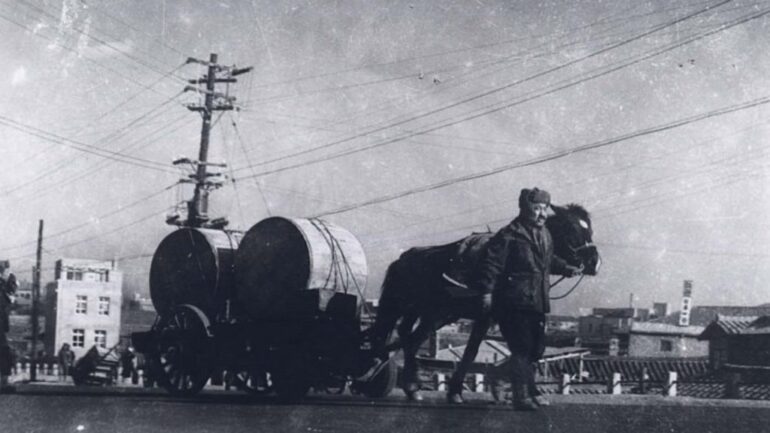- Empty cart.
- Continue Shopping
South Korea – Squid Game and Halloween Trampling

On October 29th, 2022 about 120 people were trampled to death in an outside Halloween party in Korea, and 100 were injured. This is a shocking tragedy, but what does it have to do with Squid Game, a popular TV show released about a year ago?
Squid Game is a show about a survival contest. 450 people who are severely struggling in debt are gathered together to play deadly versions of childhood games in an effort to win the grand prize, a lifechanging amount of money no person could ever hope to spend in one lifetime.
Hwang Dong-hyuk, creator of ‘Squid Game’, has said the smash-hit Netflix series was intended to pose questions about modern capitalist society that corners people into extreme competition.
“I thought capitalism has shown its own limitations in the 21st century,” Hwang said in an online speech at a forum organised by SBS TV, reports Yonhap. “Everybody faces fiercely competitive situations and they are dragged down to the rock bottom of society if they fail to survive the competition.”
This statement cause a big controversy when it first aired, but it’s something that describes the society of South Korea very accurately unfortunately. Intense competition, high expectations, and very little sympathy for those who fall through the cracks. Is the cause really capitalism?
Well, the answer to that depends on how you define “capitalism”. When most people speak in defense of capitalism what they are really saying is “I don’t want a system similar to what is in place in modern day China and North Korea, or what it was like in USSR”. If you really listen to what people are saying, they are defending private ownership of business, free markets and free trade, and limited government control in people’s day to day business. Usually these people are business owners, and they don’t want to lose the ability to be business owners and all the advantages of the lifestyle, which includes a lot of personal freedom, being your own boss, doing what you love to earn money.
However, that’s not the “capitalism” Hwang Dong-hyuk is attacking. He is attacking large corporations which do the opposite – large corporations destroy local culture in favour of consumerism, they trap people in a ratrace of doing mindless, joyless work for the benefit of someone else, they force their workers into fierce cutthroat competition with one another and reduce people to their numbers.
Why is this the case? How did it come to it? When thinking of big corporations, everyone thinks of American brands – Amazon, Google, Microsoft, IBM, etc. So why is South Korea so much worse in this regard (although to be fair, tramplings are a common story in United States. I’m more surprised if no one gets trampled on the larger “holidays”)? There are a couple of reasons which have to do with history and international politics.
United States had a “slow” industrialization period, with it being ahead of everyone else. That sounds like a paradox. But US had a long period where industrialization was developing, where markets and people had time to adjust between the various technological and societal leaps which mark the period. As a result, workers in US had time to protest and demand rights, and smaller businesses had time to adapt and find their niches as the big giants slowly arose. In contrast, when South Korea was industrialized, it all happened in one big jump, where all the technologies and methods were suddenly given to the ones seeking to create large enterprises. And the people had little opportunity to do anything else.
Beyond that, look at the history when South Korea began industrialization, and the circumstances. It happened before and after the Korean War. The North Koreans, seeing what industrialization was doing to the people, decided to take extreme measures in the opposite direction. And during the war, both USSR and China were on the side of North Korea, South Korea became an important strategic ally of the United States. But, “alliances” and “friendship” are only possible between equals. South Korea was as unequal as one can be compared to the massive military and economic strength of the United States. So what really happened was that just as North Korea became an extension of Chinese Communist Party and USSR, South Korea de-facto became an American colony. What really happens is that South Korea’s economics and politics are dictated by United States – their government, military and corporations.
Corporations are not nice, not friendly, they don’t care about their workers or consumers. They care about profits, and they will sue other corporations that don’t. Sure, they make a big deal about not caring about your race or sexual orientation, but that’s because it’s all the same to them who they overwork and whose spirit they crush into the sweet, sweet green money paste. And the thing about having free range in a developing country like South Korea was in the 1950s, is that it’s full of labour and resources, and doesn’t have any of the pesky consumer protection of labour laws as they do back home in the US.

To the credit of the Korean people, they recognized their situation, and have collectively developed a culture of high work ethic, and valuing intellectual labour, using their historical and cultural resources to create more value for themselves (and the big corporations) doing skilled work and intellectual labour. From cheap cars to cheap animation studios, South Korea’s export requires talent and brings them well-deserved recognition. But their economy is still not an economy that works to the benefit of the Korean people, it’s an economy that works to the benefit of the rich CEOs and shareholders – it’s an extraction economy. As a result, the people doing the work have to work hard, they have to be talented, and their rewards are few. Things back home in the US or Canada are similar, but not so bad, as we have a long history and culture of workers’ rights and small business, which creates opportunities and alternatives to enjoy the fruit of their labour. But South Korea did not have, they industrialized overnight with our help and guidance, and our “help” and guidance made sure that we get the best side of the deal. And by “we” I mean big corporations, although Korean car brands for example are well known, and are a reasonably priced alternative for their quality.
So to answer the question, are the problems in South Korea’s caused by “Capitalism”? Well, they’re under military occupation and colonialism, and for some people that’s what “capitalism” means, so it’s true for them. It’s important to listen to people and hear what they mean by the words they use, because people aren’t always just using the dictionary definition.
The corporate economics seek to turn people into numbers on their bottom line. They pit people against one another, isolating people through cutthroat competition or even just sheer exhaustion from constantly being overworked and struggling to make ends meet. It erodes cultural bonds, and replaces them with their own consumer fads, such as how Halloween, an Anglo-Saxon celebration is the cause of the tragedy. Why were Koreans celebrating it? Because Western Media is aimed to create consumers, so it sells an image of successful Western people, and people naturally emulate those who are successful. And of course, Halloween is part of a massive commercial push to sell things and make money, which is why Western Media promotes is so much. The outdoor Halloween party was the first time in several years that large outside maskless gatherings were permitted, so the lonely, overworked, hyped up young Koreans went into the streets to celebrate and “enjoy” the fun Western Media promised them, and to temporarily forget the stress of day to day life in survival mode.

Casino Vulkan https://vulkan.electronauto.ru
Top 5 Crypto Casinos in 2024 https://medium.com/@passeu/top-5-crypto-casinos-in-2024-83c74854313e
Top 5 Crypto Casinos in 2024 https://medium.com/@passeu/top-5-crypto-casinos-in-2024-83c74854313e
Top 5 Crypto Casinos in 2024 https://medium.com/@passeu/top-5-crypto-casinos-in-2024-83c74854313e
Top 5 Crypto Casinos in 2024 https://medium.com/@passeu/top-5-crypto-casinos-in-2024-83c74854313e
Lucky block licensed crypto casino 2024 https://medium.com/@passeu/lucky-block-licensed-crypto-casino-2024-c3a8673f0fab
licensed crypto casino 2024 https://medium.com/@passeu/metaspins-licensed-crypto-casino-2024-cfe2f0bd7176
licensed crypto casino 2024 https://medium.com/@passeu/casinobit-licensed-crypto-casino-2024-9443130e5dde
licensed crypto casino 2024 https://medium.com/@passeu/bitcasino-licensed-crypto-casino-2024-c5425fe1f7c4
Слоты и онлайн-игры в казино способны разнообразить жизнь человека. Важно только правильно выбрать площадку — она должна быстро и честно выплачивать выигрыши, надежно хранить персональные данные клиентов, предлагать большой ассортимент развлечений и интересную бонусную программу. Важную роль играют также наличие адаптированной мобильной версии и приложений. https://enic-kazakhstan.kz/
The Basic Principles Of buy injectable steroids. https://posecii691mbn7.blogmazing.com/profile
ED Trial Packs Brand & Generic . https://valoto.pw/catalog/category/ed-trial-packs
Punter Guide escort guide offers sex clubs. https://johnnysfse47025.alltdesign.com/benefits-of-hiring-escorts-in-dubai-46846476
Punter Guide escort guide offers sex clubs. https://judahdlyj69146.aboutyoublog.com/27467264/if-you-want-to-enjoy-the-finest-luxuries-of-dubai
Injectable Steroids DIANABOL buy online. https://injectable-steroids-dianabol-buy-online.webflow.io
Injectable Steroids DIANABOL buy online. https://thekiwisocial.com/story2513493/injectable-steroids-dianabol-buy-online